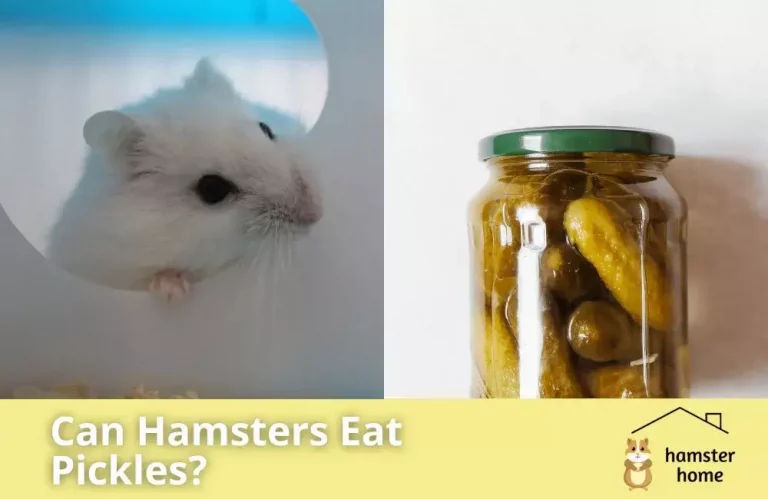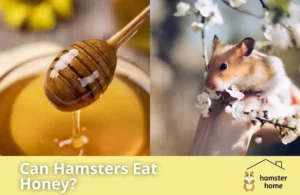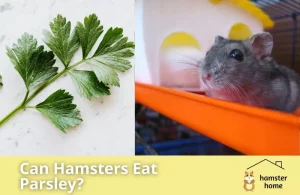Can hamsters eat pickles? That’s a solid NO. Nobody, including hamster experts and general owners, would ever recommend you feed pickles to your hamster. Pickles are very harmful to hamsters and can cause a lot of harm if fed, even in minimal amounts!
An Introduction to Pickles
To understand why hamsters and pickles don’t work well together, you must first know what pickles are composed of. Pickled cucumbers, or pickles for short, are cucumbers left about to ferment after being dipped in vinegar.
Depending on the type of pickles you prefer, the cucumbers can be pickled with other substances aside from vinegar; these include brine, lemon, and even kool-aid!
Pickles are served mainly as side dishes and are often seen at festivals. They are effortless to procure as they appeal to quite a diverse palate. After all, there aren’t many foods that can be fried, eaten with soups, and paired with fish and chips too!
You’ll find pickles all over the world and a large majority of people around the globe seem to enjoy them. But that, unfortunately, is where the line is drawn. After all, just because pickles appeal to human taste buds doesn’t mean it’s safe to eat for our furry little friends.
Why Can’t Hamsters Eat Pickles?
Hamsters and pickles are simply a big fat NO. After eating pickles, regardless of what breed of hamster you may have, your furry friend will surely face an adverse reaction which we will discuss below. If you want to reward your hamster, resorting to other foods that are more naturally sourced, such as apples and bananas, would do much better both health-wise and taste-wise.
Let’s look deeper at why pickles and hamsters don’t generally mix well.
Pickles are Just Way too Acidic.
You’ll already know how acidic they can be if you’re a pickle lover. Such acidity simply means pickles are not a good choice for your hamster.
Eating acidic foods can cause a lot of problems for your them. Hamster’s little stomachs just aren’t equipped to handle such levels of acidity, which can cause stomach problems (sometimes severe) and can make them highly uncomfortable. And this is when we’re just considering pickles in general, don’t even get us started on some of the more acidic pickles out there!
So yeah, to ensure that your little furry friend lives a strong, healthy, and fulfilled life, try to keep it away from acidic foods altogether, not just pickles.
Pickles are Salty too
How dangerous can a little salt be, right? Well, NO! Salt is hazardous for your hamsters. While we as humans tend to include salt in many of our daily delicacies, even a tiny fraction of our everyday salt intake can cause serious health problems in hamsters.
Pickles pack quite a bit of salt. This is mainly due to the broth used in the fermentation process. And while this level of salt is pretty comfortable for the human tongue, this isn’t the case for hamsters.
The salt inside pickles can cause your hamster severe problems, including dehydration (a pretty serious issue) and even heart problems.
Vinegar as Hamster’s Natural Enemy
Pickles aren’t suitable for your hamsters mainly due to the two reasons above. However, let’s keep general reasons aside and look at pickles paired with vinegar.
While there are many options to pickle cucumbers before the fermentation process starts, the fan favorite and one found almost anywhere throughout the world remains vinegar. This is precisely why we’ll discuss vinegar’s threat to your little furry friend.
Vinegar as a substance is toxic to your hamster. You should steer your hamster away from any food that contains even the slightest bit of vinegar. If fed pickles that have vinegar, aside from the other health problems mentioned above, your hamster will face serious digestive issues at the very least. Therefore, keep vinegar away from your hamster!
How do you Deal With a Hamster that has Consumed Pickles?
You may read this article quickly after accidentally giving your hamster some pickles. Calm yourself down first and contemplate the situation at hand more deeply. If your hamster has been fed a minimal amount of pickles, it’ll be fine and won’t be affected much. Still, however, keep an eye out for any signs of illness from your hamster and have plenty of water at hand for your hamster to drink.
The chances of facing such a situation are relatively high as hamsters tend to store food rather than eat it all at once. Since hamsters love to poach and store food around, check your hamster’s cage and all its favorite hiding spots thoroughly for pickles and replace them with some natural fruits or vegetables instead to prevent it from getting stressed out (hamsters are actually very sensitive creatures!)
Alternatively, if your hamster is already showing early signs of illness, take your hamster to the vet as soon as possible. Don’t worry; your hamster can be saved if you move swiftly, and you won’t be judged!
FAQs
Most hamsters love to eat dandelions, cabbage, carrots, and carrots.
While a hamster can eat cheerios, you shouldn’t feed them often. Cheerios have high levels of sugar, which cause a spike in a hamster’s blood sugar if fed too often.
Not! Chocolate contains Theobromine, a chemical that is highly harmful to hamsters. Depending on the amount of chocolate consumed, you might even endanger your furry friend’s life!
Takeaway- Can Hamsters Eat Pickles?
Unfortunately, no. Your favorite side dish simply isn’t compatible with your hamster. To save your hamster from a horde of illnesses, keep pickles and all things pickled miles away! This is mandatory to save your hamster from several health complications and more.






